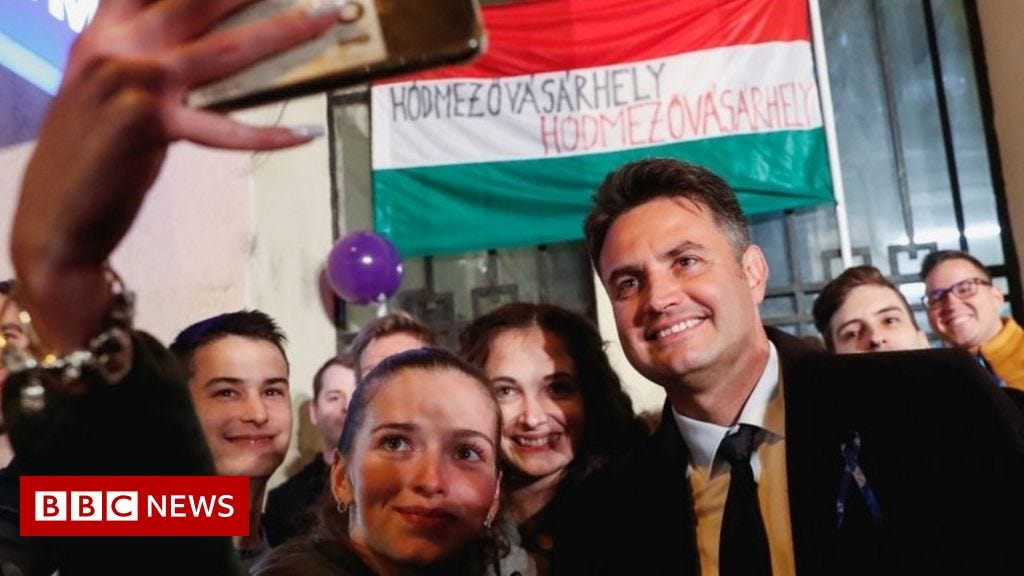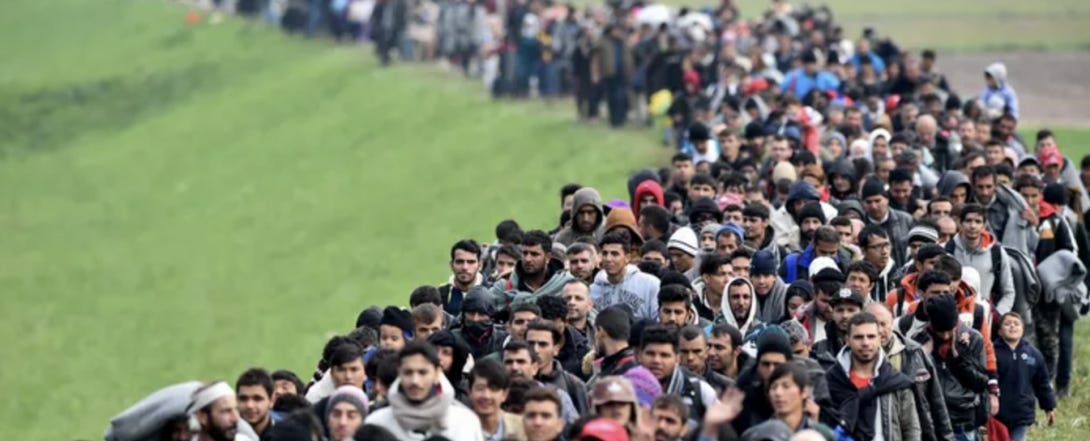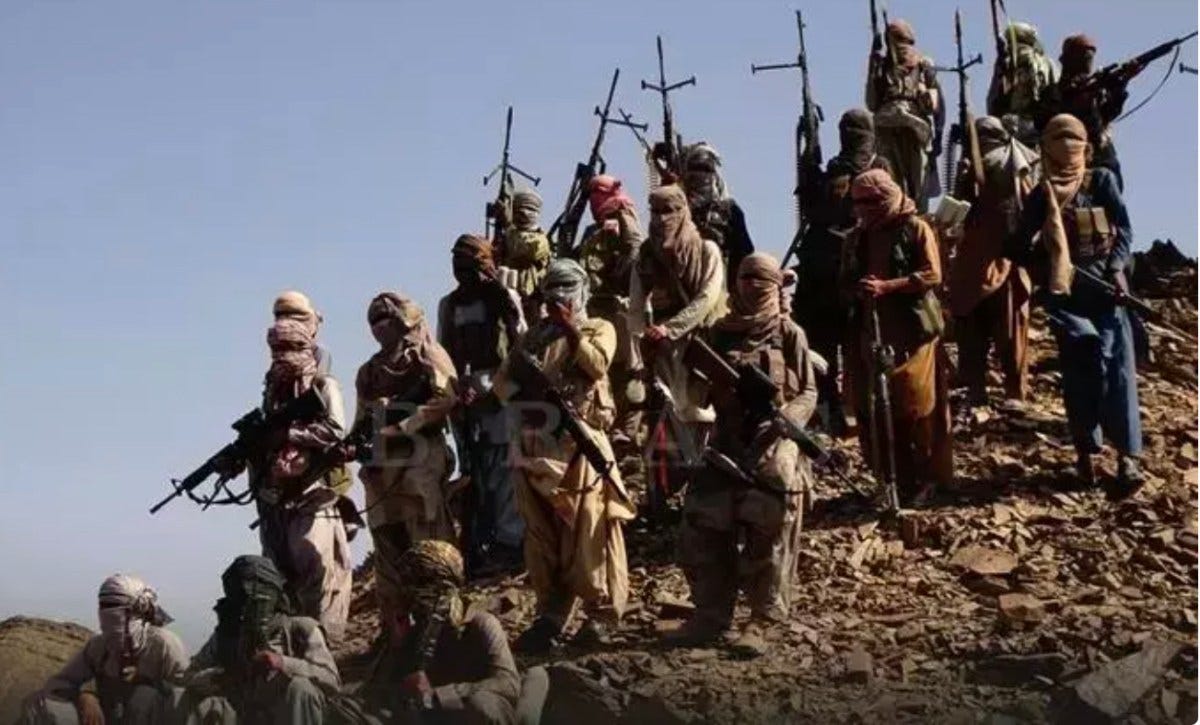Saturday Commentary and Review #71
Hungary's Faltering Opposition, Newer, Massive Migrant Waves for Europe?, Rio's Zio-Narcos, Balochi Militants vs. China, Danish King Eric VII the Pirate
There are two elections that we are watching closely in 2022 on this Substack: one for the French Presidency and the other to determine the composition of the Hungarian Parliament. Both are scheduled for April of this year, and both are rather important.
We’ve covered the rise of Eric Zemmour and his candidacy here in the past. If present trends continue, the French will once again punt their futures by choosing Macron as the least dangerous option. Two months is a long time on the campaign trail, so we will turn again to France soon enough.
The Hungarian vote is just as interesting and as significant as the one being held in France. For almost 12 years now, Hungary has been ruled by the Viktor Orban-led Fidesz party. They have managed to win majorities and super-majorities, allowing them to change the constitution, and consolidate their power. Leftists, liberals, and some conservatives have cried foul, criticizing Fidesz for strangling the media and for being corrupt. Their real crime though, has been going off-script when Merkel invited in millions of migrants to settle Germany, refusing them passage through Hungary and rejecting EU moves to have them redistributed across Europe.
Orban and Fidesz have been decried as xenophobes, bigots, and so on, in that they reject the liberal secular orthodoxy that has a stranglehold on much of the west. Orban’s Christian expositions are seen as backward and incompatible with the Brave New World.
He and his party have made powerful enemies outside of Hungary despite being wildly popular at home. The EPP umbrella of centre-right parties in the EU Parliament has kicked Fidesz out of its grouping, while American billionaire and avid regime changer George Soros (born in Hungary) is on jihad against Viktor Orban, and has brought along the US State Department, and the western media/NGO complex along for the ride. All of this, of course, while Hungary is a reliable member of NATO and a democracy. It’s just the wrong kind of democracy.
This means that Budapest needs regime change.
For veterans of the regime change game, all the old familiar patterns are here. When the USA sought to change the governments in Zagreb, Belgrade, Kiev (twice!), Tbilisi, and elsewhere, it would gather all the opposition parties together in a grand, sweeping coalition, to challenge the party in power. If the vote was close enough, it would declare victory. If the opposition victory wasn’t accepted by the government, then protests would commence alongside a western media blitz and communiques from the US State Department and its allies in other countries, composed of the most wild absurd accusations.
Hungary is now experiencing the same operation; late last year the opposition conducted a primary (a new American political import) to select which figure would go up against Viktor Orban. The opposition covers the whole of the political spectrum (unless one believes that the fascist Jobbik has actually reformed itself and moved to the political centre), making it incredibly shaky. Peter Marki-Zay, a small town mayor and conservative Catholic, was selected to challenge Orban. The thinking went that a challenge from the right by a man untainted by accusations of corruption would split the conservative and nationalist voting bloc that has dutifully backed Fidesz this past decade.
Fidesz has only begun to roll out its big campaign guns, but is already receiving help from that same wide and fractured anti-Fidesz coalition, as Marki-Zay seems prone to spurting out gaffe after gaffe, as this piece reports:
Marki-Zay’s initial appeal:
Márki-Zay’s aggressiveness and self-portrayal as a Christian conservative was seen as a game-changer in winning over undecided voters. Finally, a fresh face who could turn the tables—or so many claimed. He was expected to deliver the undecided voters to the opposition, and perhaps even gain the support of some disgruntled Fidesz voters. Pollsters showed the joint opposition leading the ruling Fidesz-KDNP alliance.
Rookie mistakes:
Márki-Zay had made very negative comments about the most popular policies of Viktor Orbán’s government: zero tolerance on illegal immigration and a cap on energy prices for households. Márki-Zay also expressed readiness to scrap the minimum wage (which is now higher than the average wage was during the socialist-liberal governments, and which was raised again as of 2022).
Shitting on his own people:
Furthermore, Márki-Zay had his “deplorables” moment, labeling Hungarians who support border protection and the cap on energy prices as “dumb” and “mushrooms, kept in the dark, fed manure.” He later doubled down on his statement, repeating the word “dumb” over and over again. His oft-humiliating remarks about his allies have continually made coordination difficult and caused party leaders to consistently and publicly shoot back at him.
Shaky, big-tent coalitions cannot agree on much except to change the government. But what do they offer? Here’s what the Hungarian opposition can agree on:
The opposition parties still have no manifesto on which they can agree on, nor a flagship policy proposal. Their only visible call to action is a collection of signatures to organize a referendum with two questions, one about blocking a Chinese university from starting a campus in Budapest, and the other about extending the duration of the unemployment benefits.
Fidesz will simply counter by extending those same unemployment benefits at the last minute.
The failure of the opposition as a whole:
The opposition must also agree on a common party list. In the Hungarian parliament, 106 seats are won in single constituencies and 93 seats are apportioned according to votes cast for party lists. As prime minister candidate, Márki-Zay had plans to form a group of his own, dividing the pie between seven, rather than six, opposition groupings. He was denied by opposition parties in early January, but Márki-Zay expressed hope that the parties still might change their minds.
In countries with so many parties in a ruling coalition, coming to an agreement often takes several months. The Hungarian opposition must now pull this off in record time and with no prior experience. The parties are losing their patience with Márki-Zay. This does not bode well for their desired national-election outcome this coming April—to best Orbán at the polls and wrest political control of Hungary away from the Fidesz-KDNP coalition that Orbán leads.
Joining forces seemed a good idea—on paper. But striking a deal without any ideological common ground, other than their expressed desire to remove Viktor Orbán from office, is yet another headwind for the opposition parties to overcome. They held primaries, but none of the parties was able to win outright with a definitive mandate to lead the opposition. And now they have a prime ministerial candidate who doesn’t want them and whom they don’t want either.
(please note that one of the authors of the piece quoted above is an advisor to Fidesz)
Not to worry, as the media-NGO complex will simply declare the vote ‘rigged’ if the opposition gets close enough to Fidesz in the final tally. Daniel Hegedus of the German Marshall Fund (partially financed by George Soros’ Open Society Network) is planting this seed in advance:
The European Union might well be facing the first-ever significantly rigged election in one of its member states.
How European institutions and other member states react to this challenge will have a crucial long-term impact on the democratic credentials of the EU, and the integrity of elections in Central and Eastern Europe more generally, Poland in particular.
Europe must be prepared for the eventuality of a rigged election in Hungary. The utmost must be done to avoid it, and due preparations must be conducted how to respond.
EU member states should join the United States in asking Europe’s official electoral watchdog, the OSCE’s Office for Democratic Institutions and Human Rights, to send a full-fledged observation mission to Hungary with hundreds of short-term observers who can properly monitor processes on the day.
Such a mission could deter the regime from worsening election-day irregularities - and even if not, it could play a crucial role in documentation.
Furthermore, European leaders must consider a contingency plan in case Orbán does hold onto power through a rigged election.
Sanctions mechanisms, like the Article 7 procedure, will still be blocked by Poland. Freezing bilateral relations, as happened in 2000 with Austria, and imposing coordinated but national-level sanctions against key stakeholders in the Orbán regime might be the best tool the EU can deploy.
In the 2022 Hungarian elections, European democracy might be approaching its very own Capitol moment. EU institutions and member states should use the available time wisely to prepare for it.
Please note that:
Daniel Hegedüs is Transatlantic Fellow for Central Europe at The German Marshall Fund of the United States.
Of course he is.
In come various European parliamentarians to follow the Soros-lead in requesting an OSCE election observer mission be sent to Hungary.
It’s all so tiresome.
There is a constant cycle of demonization/demoralization in the West these days, in which people, specifically whites, are told that they are inherently evil, privileged, etc., while they are advised to stop having children so as to save the Earth from climate change. What makes this all the more harmful is the steady inflow of migrant populations from foreign cultures who are brought in for cheap labour to purportedly plug holes caused by falling birth rates in the west. Westerners are then informed that they must respect their cultures and must make way for them in the name of diversity, equality, and inclusion. A sizable portion of westerners get the creepy sensation that they are, over time, being replaced.
The Great Replacement Theory, as it is now being termed, is being decried as a ‘white nationalist conspiracy theory’, meaning that anyone who agrees with it is a Nazi who wants to open concentration camps to kill Jews, Blacks, gays, and others. Eric Zemmour has openly discussed this theory in France on the campaign trail, taking a hammer to the Overton Window.
What if these bigoted extremists are right? Dr. Parag Khanna, reported to be a leading expert on migration, tells us that the migration of hundreds of millions to the West will be a good and necessary thing due to climate change and global economic inequality. I guess it’s a matter of who says it. If the right person says it, then it’s not a conspiracy theory.
THE future for Scotland, like the rest of the Western world, is probably going to be Asian. The country will find itself swept up in the coming “Great Migration”. We will see a “brownification” of Scotland, as demographics and mass migration coalesce to change the complexion of the West.
Scotland’s political culture, with its pro-immigration slant, and our geography and natural resources, which see us well placed to withstand the climate crisis, will make us a magnet for a new generation of migrants set to reshape the 21st century.
Billions:
Today, climate change has been added to the forces compelling migration. Throughout this century, swathes of the planet will become uninhabitable, it’s predicted, displacing entire populations.
“In this century,” says Khanna, “in just 20 years, climate change already accounts for 30-40 per cent of total displacement in the world.” So, the drivers of migration are now threefold: “You’ve got one-third economic, one-third political [wars and persecution], and one-third climate change and, of course, they all tie together. Look at the Syrian drought which led to urbanisation, political unrest, civil war and an exodus of nearly one-quarter of the population as refugees.”
In this century, says Khanna, “we’re talking about billions of people moving – that’s what I’m trying to explain, literally billions”.
COVID regimes that have been put into place these past two years have served as a neat way to practice country-wide shutdowns. As Climate Change is now a global faith of the elites, one must conclude that ‘climate shutdowns’ will be part of our future, alongside social credit scores tied into carbon footprints for each and every citizen (with various elites being excused for the good of humanity, of course). The fight against climate change can only come by way of political authoritarianism, as no one votes for a significant decrease in their own living standards at election time.
Asians as our future:
THE people of Asia will dominate the coming “Great Migration”. “Asia has more than 50% of the human population,” says Khanna. “Geographically, Asia and Europe share a mega-continent: Eurasia. Simply put: it’s far easier for Asians to recirculate around Eurasia than it is for Africans to move to Europe or Latin Americans to America. The Asian population is also younger and more mobile … If you want to capture the future of human demographics in two words it’s ‘Asian Youth’.”
Asian youth is well-educated too, with students excelling in science and IT.
“Asian birth rates are still high and Western birth rates are practically zero,” says Khanna. “Therefore, by the law of simple arithmetic, evermore of the world’s future population is Asian … The future is Asian.”
Europe should be begging for migrants from the Indian Subcontinent:
EUROPE should view mass migration not just as a benefit but a lifeline, Khanna believes. The West’s entire discussion around migration is cock-eyed, he feels. We have low birth rates, ageing populations, not enough workers – especially to care for our growing elderly populations – and plenty of space. “Europe should be competing in a cut-throat manner to recruit as many smart Asians as possible.”
Instead, Europe has seen the rise of anti-immigrant nationalist and populist politics. “You cannot simultaneously hold that labour shortages are becoming more acute and also hold that populism remains an immutable force because the truth is that the more painful the demographic and therefore fiscal circumstances become, the more likely it is that populism will have to bend to economic realities,” Khanna says.
“We tend to default towards this view that national identity and anti-immigration postures are the persistent norm and everything will have to hold and wait until a Great Enlightenment transpires. That’s not at all the case. If that were true Germany wouldn’t be the mass-migration country it is today.”
You will be replaced, but if you say so, you are a conspiracy theorist:
Unless Western nations want to decline inexorably, “immigration policy needs to be dictated by supply and demand” not insular notions of identity. Khanna also notes that the current manifestation of populism may, quite literally, be short-lived. The mostly elderly “xenophobic populist generation is heading for the Big Brexit in the Sky”, he says. Meantime, anti-migrant policies are damaging Western economies, he maintains.
The West should become one, big Canada (a shopping mall):
The media has skewed the conversation on migration, Khanna believes: concentrating more on bogeymen like Hungary’s authoritarian populist Viktor Orban than Canada’s liberal Justin Trudeau.
Focusing on Orban flies in the face “of the nature of reality”. Says Khanna: “Canada absorbs more people in a few years than the entire population of Hungary; Orban is on his way out, and nobody wants to go to Hungary anyway. We put all this attention on a peripheral loser rather than the greatest mass-migration story of the 21st century: Canada. Shame on us for that. We do ourselves a great disservice.”
He even brings up the racial aspect:
‘Brownification’
MIGRATION means that racially the world is already “mongrelising”, says Khanna, and as the century moves forward we’ll only see more of this “robust mongrelisation of the world” – genetic mingling that’s inevitable as a result of different populations mixing in all corners of the planet”. In London, Mohammed is already the most popular baby’s name, Khanna adds. We’ll see the effects of “mass migrations play out over the next 30-50 years”, he says.
The West will undergo “brownification”, Khanna believes. “If Asian youth represent the majority of world youth and the majority of world migrants, they also represent the majority of future mummies and daddies. We’ll see an ever higher proportion of the world’s children with brown complexions and less with white complexions. You can’t refute that or do anything about it – it’s all part of the beautiful, deep tide of history and demographics.”
One cannot help but immediately sense the triumphalism in Khanna’s words.
Brazil is a wild place with a very complex political culture that reflects the odd dynamics of its society. I am convinced that it would take quite a bit of effort to get a solid grasp on life there, requiring at least a year of living on the ground in various places, so as to see all of its cultures up close.
This past week I learned of the existence of Zio-Narcos in the favelas of Rio de Janeiro. Evangelicalism has taken much of Latin America by storm, supplanting Roman Catholicism and its centuries’ old monopoly on faith. This evangelicalism is wildly popular in Brazilian favelas, where life is rough, tough, and cheap. Only in Brazil will one see gangs of drug-dealing murders try and harmonize their way of life with that of Christ.
On the rise of Evangelicalism:
Charismatic Christianity is on the rise across Brazil. Slightly less than a third of all Brazilians identify as evangelical, up from 5% in the 1960s. The 2020 national census is expected to show significantly more growth.
In Rio, where the evangelical population increased 30% in the first decade of this century, even some of the most notorious drug dealers claim to be spreading the gospel.
Here’s where it gets interesting: Some of these evangelical drug dealers are waging a jihad on Afro-Brazilian religions in their vicinity:
According to Brazil’s Commission to Combat Religious Intolerance, over 100 Afro-Brazilian religious facilities nationwide were attacked by drug trafficking groups in 2019, an increase on previous years. A national emergency hotline created to report such attacks finds that 60% of incidents reported between 2011 and 2017 occurred in Rio de Janeiro.
Persecution of these Afro-Brazilian religions, whose adherents are largely poor black Brazilians, has been around since at least the 19th century.
But the current wave of religious bigotry is more personal, and more violent, than in the past. As the Washington Post recently reported, Afro-Brazilian priests are being harassed and murdered for their faith. Candomblé and Umbanda practitioners fear leaving their homes. Terreiros have closed due to death threats.
The appeal of ‘hard-line’ Evangelicalism to the favela dwellers:
But the fastest-growing denominations in Brazil are the harder-line Pentecostals and Neopentecostal churches – including the wildly successful Assembly of God and the Universal Church of the Kingdom of God.
Both spread what’s called the prosperity doctrine, promising personal salvation and financial success to people who trust God, work hard and cut out all alcohol, gambling and other vices.
For many poor people in the Rio’s hardscrabble “favela” neighborhoods, this is an appealing offer.
Jihad:
Some evangelical leaders who preach the prosperity doctrine also see these Afro-Brazilian religions as dangerously un-Christian, even evil.
Edir Macedo, the multi-millionaire bishop of Brazil’s Universal Church of the Kingdom of God, wrote in his 1997 book “Orixás, Caboclos and False Gods or Demons” that Afro-Brazilian religions “seek to keep us from God. They are enemies of Him and the human race.”
“This struggle with Satan is necessary…to eternal salvation,” he added.
The book sold 3 million copies before it was banned by federal authorities in 2005. But Macedo still peddles his message to his estimated 5.2 million followers at 13,000 affiliated churches.
For preachers espousing a binary spiritual worldview, “good” Christians must wage holy war against “evil” practitioners of Candomblé and Umbanda.
Drug dealers as the foot-soldiers of this jihad:
That includes a handful of drug kingpins, who prohibit adherents of Afro-Brazilian religions from practicing their faith in gang-controlled neighborhoods. Residents caught wearing the religious garb of Candomblé and Umbanda may be expelled from the community.
Prisons as recruiting grounds:
The government is only nominally in control of most public prisons in Brazil. In practice, they are essentially governed by one of two competing Brazilian drug trafficking organizations, which run their trafficking and racketeering businesses there and recruit their rank and file from behind bars.
Faith groups, too, have a long tradition in Brazil’s prisons. Previously, these prison ministries were predominantly Catholic. Today, however, 80 of the 100 faith-based organizations subcontracted to run social programs in prisons are evangelical churches.
As a result, charismatic Christianity has spread quickly through the criminal justice system.
Jailhouse conversions are common. Inmates who adopt evangelicalism are frequently housed in separate prison wings that stand out for their order and cleanliness. Some have even established their own ministries inside jail. Developing positive relationships with local Rio pastors while in jail can tighten a gang’s grip on power once released.
Converted traffickers control many Rio de Janeiro favelas, particularly in Baixada Fluminense, a sprawl of townships in the city’s poor northern outskirts.
One cannot help but think of how the Nation of Islam recruits Blacks in US prisons in much the same way.
The thought struck me that this rise in Evangelicalism is due to people ‘backing the strong horse’, as Osama Bin Laden explained. It wasn’t too long ago that there were reports of converts to Islam among the natives of Chiapas, fighting their war against the Mexican Government. In Brazil, Evangelicalism continues to make great strides, especially the Prosperity Gospel, an American creation. When combined with the rise of self-identified Jews in Nigeria (especially Biafra), was Bin Laden correct?
What an insane coincidence that Balochi militants are now targeting Chinese interests in Pakistan! This has absolutely nothing to do with the USA’s Pivot to East Asia, nor with China’s One Belt, One Road (OBOR) infrastructure project, and it certainly has nothing to do with the CIA, nor US efforts for regime change in neighbouring Iran, nor the recent departure of US Armed Forces from Afghanistan. It is purely a coincidence, and suggesting otherwise means that you are a conspiracy theorist and probably bigoted against Balochis and want to deny them their human rights.
In a new phase in the long-running Baloch separatist war in Pakistan, a recent Baloch Nationalist Army (BNA) terror attack in the city of Lahore indicates the insurgency is expanding from Balochistan’s rugged mountains to Punjab urban centers.
On January 20, a bomb blast ripped through a busy Lahore business district, killing three and wounding over 20. The BNA, which was formed less than two weeks before the bombing after the United Baloch Army (UBA) and the Baloch Republic Army (BRA) merged, accepted responsibility for the attack in a social media post carried by media.
The merger is significant not only because it fuses two potent militant groups fighting for the separation of Balochistan from Pakistan but also because the new entity will target China’s interests in the country, including likely Belt and Road Initiative (BRI) projects.
Much like how the Hungarian opposition has been united to take down Fidesz and Orban, Balochi separatists are also now engaging in big tent politics/terrorism to harm China and its economic and strategic interests.
Some background:
The newly formed BNA also marks the coming together of the Marris and Bugtis, two of Balochistan’s largest tribes that historically have not always seen eye to eye.
But where the tribes do agree is in their fight against perceived state abuse in Balochistan, perpetuated in many instances through military-protected, China-funded infrastructure projects that they contend do not help or involve local populations.
The UBA is led by Mehran Marri, the son of late Baloch ideologue Khair Bakhsh Marri, who led the Marris for years. The BRA, on the other hand, is led by Brahumdagh Bugti, the son of Akbar Bugti, the Baloch sardar and leader of the Bugti tribe who was killed in 2006 in a military operation.
Although both Marri and Bugti tribes populate other militant groups, including the Balochistan Liberation Army (BLA) now led by Khair Bakhsh’s other son, Hyrbyair Marri, the UBA-BRA merger underlines how Baloch militant groups are increasingly converging across tribal lines to form a united front against the Pakistan state.
In 2018, the BLA merged with the Balochistan Liberation Front (BLF) and BRA to form Baluch Raji Ajohi Sangar (BRSA), or Baloch Nationalist Freedom Movement.
Chinese interests as direct target:
The statement also confirmed that the BNA would continue to be a part of the BRSA, and, like the BRSA, would intensify attacks against both “Pakistan state and its partners (e.g. China).”
This expansion appears to have two tactical facets. Whereas the BRSA has been keen to choose hard targets – Pakistan security forces or Chinese personnel and projects – the BNA’s first attack in Lahore, which apparently was originally going to target a bank, shows it will focus at least partly on soft targets in urban areas both inside and outside of Balochistan.
China’s OBOR runs across many states that are not able to control the whole of their territory, meaning that there will be fires purposely spread to hamper its development. The use of Islamist militants is par for the course for the USA, as it is a tried-and-tested method of destabilization, first succeeding in Afghanistan during its war with the USSR.
This week I leave you with a fun read about Danish King Erik VII who was forced from his throne and decided to strike back in vengeance by becoming a pirate, as per the tradition of his people.
Erik smiled as he lowered one knee to the deck and opened the lid of a wooden chest. The faint rays of the winter sun shone on its jeweled contents as he picked up the red-and-white scarf that lay on top: Dannebrog, the flag of Denmark — the oldest national flag in the world.
Soon the Danes would know. They would understand the full scale of Erik’s power and of his secret order of knights. His allies would rise and stand against the usurpers. The scum that had stolen his throne would feel his wrath. They had cast him out, made him a stranger and a fugitive from his own country, but he would be back. He would fight them at sea. Steal their goods, loot their ships and slaughter their men. He was still the king. It was his right. Those colors were his.
Read the rest here.
Thank you for once again checking out my Substack. Please hit the like button and the share button as well to spread this across social media. Leave a comment below if the mood strikes you, and don’t forget to subscribe to keep me cranking out content.









Leave a comment if the mood strikes you. Please hit the like button and use the share button to spread this across social media or to send to others. Thanks!
"Asian birth rates are still high and Western birth rates are practically zero,” says Khanna. “Therefore, by the law of simple arithmetic, evermore of the world’s future population is Asian … The future is Asian"
Not only is the guy obviously a nasty anti-white chauvinist, I think he's also factually wrong. India's birth rate is already just below replacement according to recent reports (and far below replacement in some states like Kerala), so what "Asian youth" exactly is he talking about? The only countries that will continue to see strong population growth into the second half of this century are in Africa and maybe some especially backwards Islamic countries like Afghanistan.